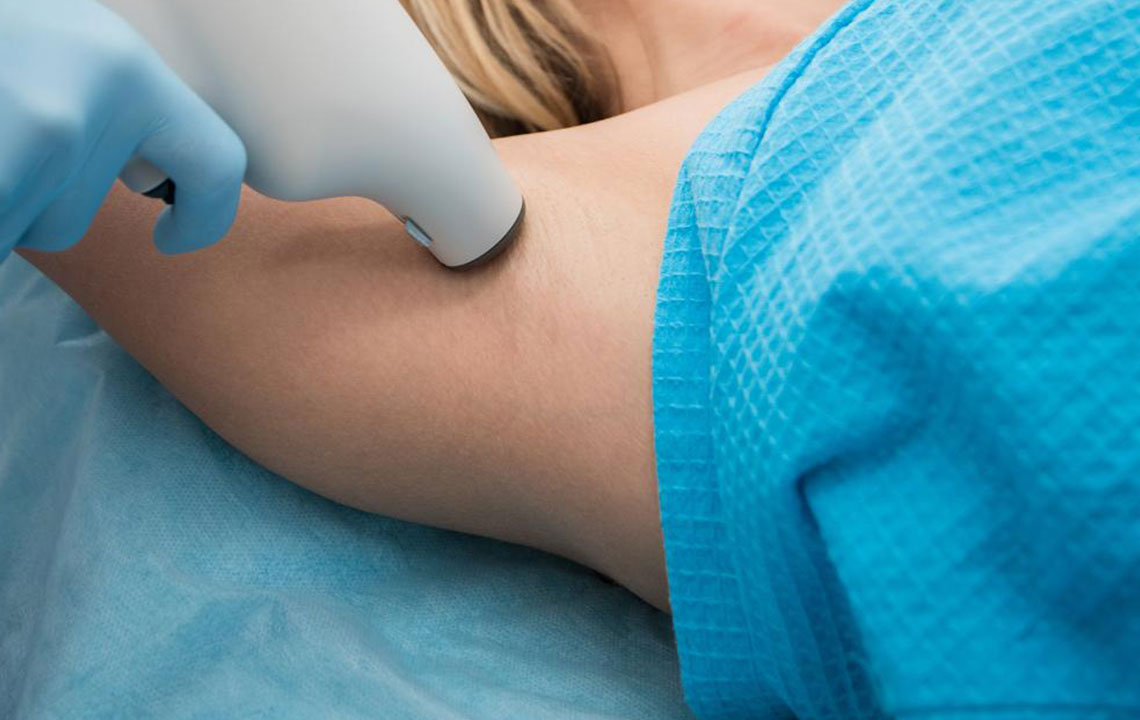Popular Treatment Options for Hyperhidrosis

Hyperhidrosis is a medical condition characterized by excessive sweating of underarms, soles, palms, and other parts of the body. When sweating is limited to these areas only, it is termed as Focal Hyperhidrosis. If sweating occurs in large parts of the body or all over it, it is called Generalised Hyperhidrosis. Patients suffering from general hyperhidrosis should consult a doctor to find the best hyperhidrosis treatment course for them.
Although hyperhidrosis is not a life-threatening condition, it can lead to embarrassing situations and degraded life quality when it poses problems in social interactions and daily life functions. Some people with hyperhidrosis refuse to shake hands, go to events, and engage in romantic relationships because of this embarrassment. In some severe cases, one might also need to change clothes frequently to avoid sweat and bacteria build up.
No two people are the same, neither is the severity of hyperhidrosis. If you suffer from hyperhidrosis, it is best to try some natural and less expensive hyperhidrosis treatments like deodorants, antiperspirants, talcum powders to see what works best for you before getting any medical procedures done. Medical procedures are more effective but are invasive at the same time.
Following is a compiled list of hyperhidrosis treatment options that will help you deal with excessive sweating. Read on to find out the best hyperhidrosis treatment options.
Antiperspirants
Antiperspirants are personal hygiene products that not only help in removing the odor from sweat but also blocks the sweat glands present beneath the skin so that the production of sweat is decreased.
You can buy any over the counter antiperspirant to combat excessive sweating. They can be applied to underarms, hands, and, in some cases, even on the forehead. The antiperspirant products can be applied both in the morning and at night to help you create a blockage between your skin and the sweat glands to keep you fresh and dry.
Over-the-counter antiperspirants do not work for people with severe hyperhidrosis. If they do not work, you can also try prescription antiperspirants. Consult your dermatologist to find out the best one for you. Prescription antiperspirants are stronger and more effective and contain aluminum salts, which block the sweat glands and make you sweat free.
Anticholinergic drugs
Doctors also prescribe anticholinergic drugs for treating hyperhidrosis. These drugs are not a long-term solution but can be taken for specific occasions to control excessive sweating.
Anticholinergics can also cause a number of side effects which can be harmful in the long run. Therefore, these medicines should not regularly be taken.
Iontophoresis
Iontophoresis is a process in which the sweat prone areas like the hands and feet are dipped in water in which a mild electric current is passed. This prevents the sweat-inducing glands from being activated. For a severe case of hyperhidrosis, quite a few visits are required to show effective results.
This procedure is not recommended for heart or epilepsy patients and pregnant mothers.
Botox injections
Botulinum toxin type A injections, generally known for removing wrinkles and sagging skin is a very effective solution for hyperhidrosis. The palms, underarms, and soles are injected with Botox over the course of several weeks till the excess sweat production starts to recede.
Miradry system
It is a nonsurgical procedure in which sweat and odor glands present in the underarm area are removed. The process uses electromagnetic energy to get rid of these glands, which causes a decrease in the production of sweat. However, this system is not available for other parts of the body.
Laser therapy
Laser therapy is used to treat mild to severe cases of hyperhidrosis. Our sweat glands are present right under the skin. In the laser treatment, a precise beam of the laser is targeted towards the affected area. The heat from the laser equipment destroys the sweat glands and makes them redundant.
Endoscopic Thoracic Sympathectomy (ETS)
This is a much debated yet effective surgical procedure which is recommended for those patients for whom nothing else works. In cases of severe hyperhidrosis, this procedure is recommended.
In this surgery, small incisions or cuts are made on the skin to cut the nerves which activate the sweat glands. This causes a decrease in overall sweat production. The ETS procedure has been found to be effective only in the underarm area. Its drawback is that patients experience compensatory sweating in the other parts of the body.
Local surgeries
Local surgical procedures for excessive sweating are focused on any one part of the body. These procedures are best for focal hyperhidrosis where the sweat production is limited to certain areas of the body. These procedures are less dangerous than ETS, hence more preferable.
As you can see, there are many options for you to explore when suffering from hyperhidrosis. Consult with your doctor for the best hyperhidrosis treatment plan for you.



